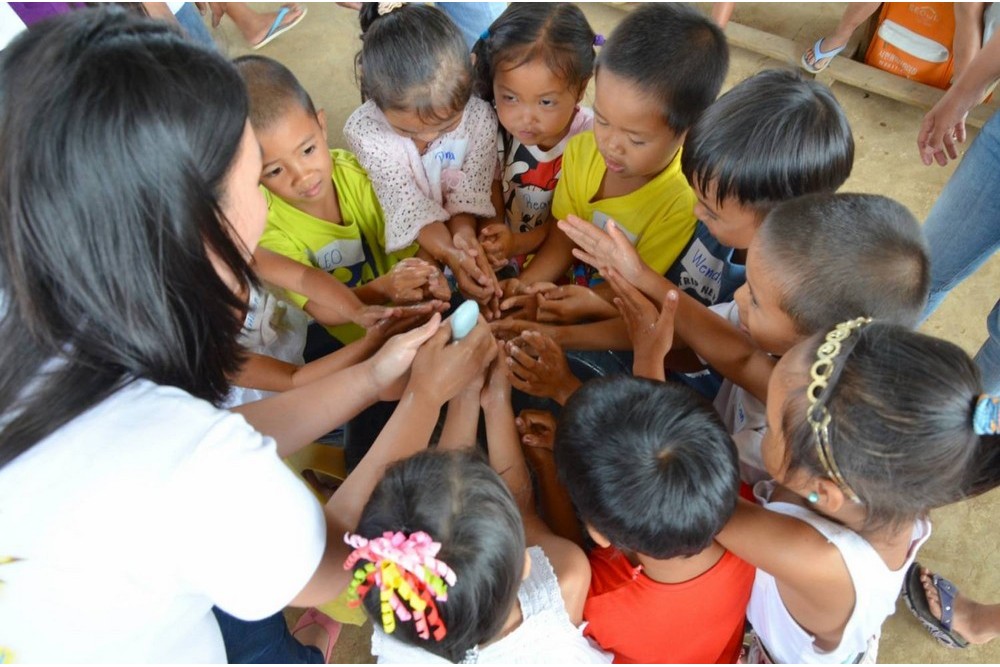
Kapit Bisig Para sa Kabataan (Alliance for Children)
DOLE Philippines

It is note-worthy that parent-beneficiaries are empowered and are given ownership of their children’s nutritional status through active participation in the project components, equipping them to take full responsibility of their family’s health and well-being.
INTRODUCTION
Kapit-Bisig Para sa Kabataan (Alliance for Children) is a comprehensive health program that has so far benefited more than 20,000 malnourished indigent children and their families. The project seeks to empower communities in South Cotabato, especially the indigenous communities, to be able to take full responsibility of their family’s health and living, hence creating a culture of health and wellness for the beneficiary-communities within Dolefil’s social landscape.The program components include stool examination/deworming, supplemental feeding, health education, backyard gardening, livelihood projects, micro-nutrient supplementation among others. KBPK is now on its 7th phase (launched in 2013) and is now more focused on sustainability such as establishing livelihood sources for parents to enable them to independently cater to their child’s nutritional needs.
FRAMEWORK AND STRATEGY
The stakeholders of KBPK have seen it develop over the last six phases. Due to its overwhelming success, the Program has extended to reach out to more beneficiaries in South Cotabato. The key to its significance is its sustainability strategies such as Health Education, through the Pabasa sa Nutrisyon (Readings on Nutrition), Backyard and School Gardening Component and Livelihood Projects, through the Market Bags Production Project, which brings in a household income of almost Php3,000.00 per month to parents of the children-beneficiaries.Moreover, regular monitoring of the beneficiaries’ malnutrition and health status is being done. The various project components are being strengthened through continuous research, innovation and maximization of resources. With the sustained implementation of the project activities, the undernourished children, their parents and other citizens of South Cotabato have gained access to better healthcare and nutrition thereby providing them the opportunity to live well-nourished lives.
ACHIEVEMENT AND IMPACT
Being a comprehensive health program, KBPK does not only provide temporary relief to its beneficiaries but rather opens up opportunities for them to sustain a good quality of life and gives them access to healthcare and better nutrition.From 1,441 beneficiaries in 2007, it now covers over 10,744 in-school beneficiaries for Phase 7 and through the years has benefitted more than 20,000 children and their families. Since the first phase until now, the improvement and rehabilitation rates in the nutritional status of the beneficiaries have been constantly increasing (from 59% & 59%, respectively, in 2007 to 91% & 88%, respectively, in 2012), while the retained in status (no improvement of weight) has likewise steadily decreased.
FUTURE DIRECTION
The project is now on its 7th phase of implementation and strategies have been developed to focus on the sustainability of nutrition intervention among identified beneficiaries through first, provision of intermediate intervention on identified malnourished children through supplemental feeding by Local Government Units with Dole pineapple products as vehicle for needed micronutrients. Conduct of Health and sanitation and Nutrition services among household beneficiaries with collaborative efforts from different Local Government Agencies is also carried out.NutriPan Bakery Project on the selected municipalities of South Cotabato will be established, and maintaining the provision of Livelihood activity to household beneficiaries for the continued production of market bags. The company will also collaborate with the different Municipalities in the Province of South Cotabato to reduce and eventually eliminate the use of plastic bags.

Dole Philippines Inc. (Dolefil) operates a fully integrated plantation and industrial facility in Southern Philippines for the production of fresh and processed pineapple and other fruit products, approximately 95% of which is exported to markets in America, Europe and Asia.




